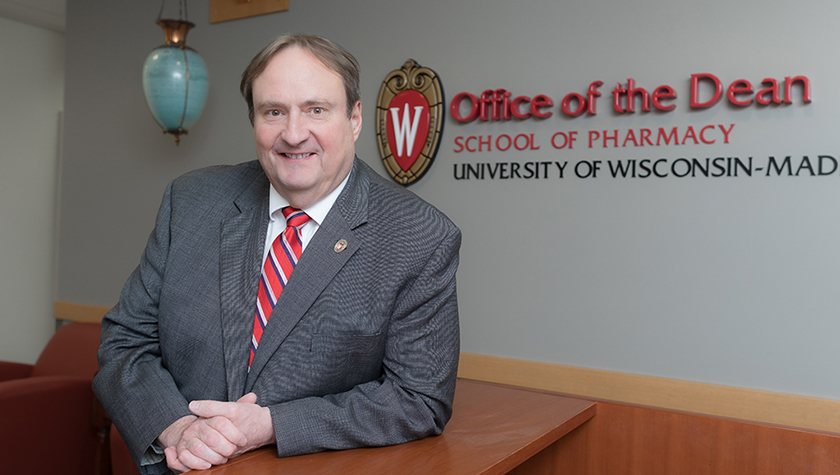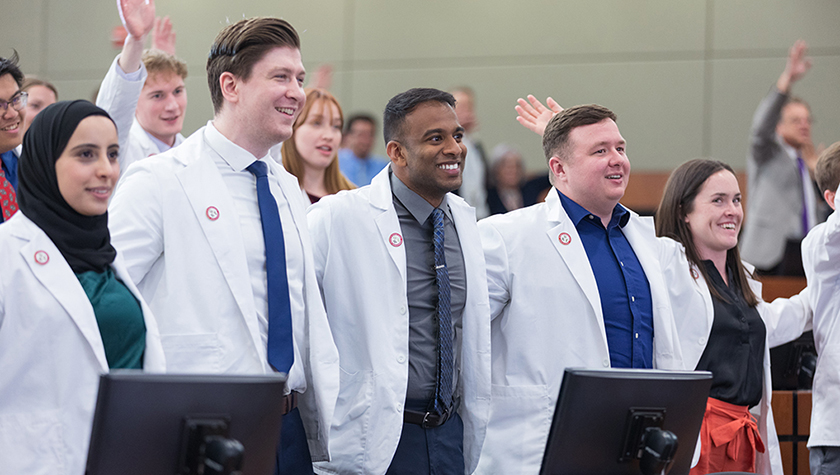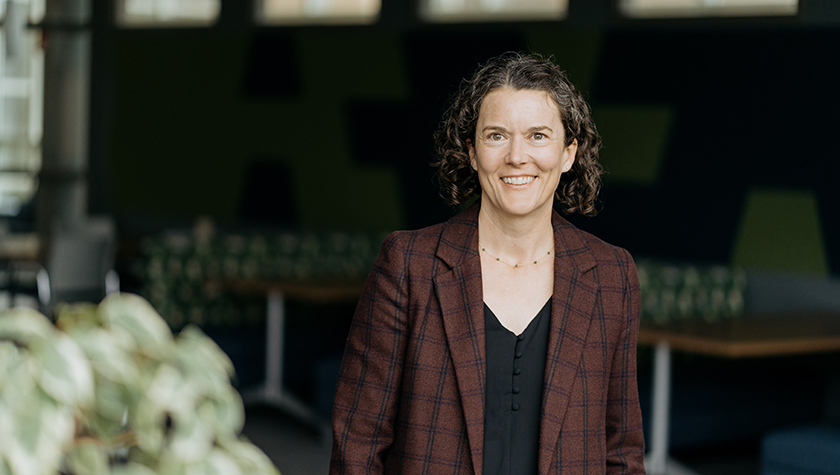
For her long dedication to interprofessional practice, education, and scholarship, Barnett is being inducted as a Distinguished Fellow in the Pharmacy Academy
By Kristin Baird Rattini
“My passion is educational design, creating activities, modules, or curricula that students find engaging, worthwhile, and relevant, and then evaluating whether it hits the mark so that we can continuously improve upon the experience,” says Susanne Barnett (PharmD ’04), director of interprofessional education (IPE) for the University of Wisconsin–Madison School of Pharmacy.
An associate professor in the School’s Pharmacy Practice and Translational Research Division, Barnett has championed the advancement of IPE not just within the School and on the UW–Madison campus but across the Big 10 Academic Alliance (BTAA) and nationwide.
In recognition of her leadership within IPE, Barnett was inducted in March as a Distinguished Scholar Fellow in the Pharmacy Academy by the National Academies of Practice (NAP). The honor recognizes individuals with significant interprofessional academic achievements and research contributions to practice.
“It’s such an honor; being inducted as a fellow within NAP is a highlight of my career.”
—Susanne Barnett
“It’s such an honor; being inducted as a fellow within NAP is a highlight of my career,” Barnett says. “The mission of NAP is to advance interprofessional education, research, practice, and public policy through facilitating interprofessional collaboration. As an organization, NAP exemplifies collaboration and is a great model for the interprofessional competences we teach our students.”
‘It showed me what was possible’
Barnett’s passion for IPE was sparked during her Advanced Pharmacy Practice Experience (APPE) rotations in her fourth year of her PharmD studies at the School of Pharmacy.
“My preceptors had such open communication with other healthcare providers, from physicians and nurses to social workers and respiratory therapists,” she says. “Everyone contributed; everyone’s comments were equally valued. It was such a collaborative team and showed me what was possible in the practice setting.”
She’s driven to instill that same spirit of collaboration in the next generation of UW–Madison’s pharmacy students.
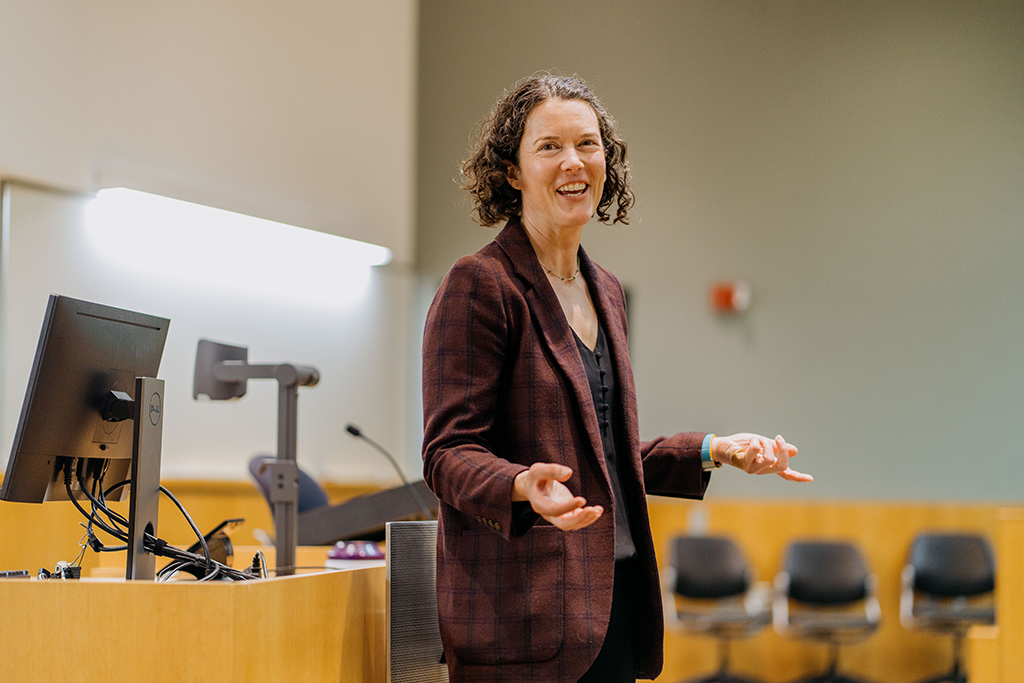
“I’m proud of the robustness of our IPE program,” Barnett says. “Over the years, our School has built a program that is longitudinal, integrated, and progressive throughout the four years of our program. It has become the gold standard for other health profession schools.”
In fact, the Health Professions Accreditors Collaborative used the UW–Madison School of Pharmacy’s IPE program as the basis for its guidance for high-quality IPE programs for all health professional education schools.
For example, first-year PharmD students participate in three IPE activities: one on teamwork, one on communication, and a simulation focused on health disparities with students from the School of Medicine and School of Public Health, School of Nursing, and School of Social Work. At the end of their first and third years, pharmacy students complete a reflection that serves as an assessment of their knowledge of interprofessional collaboration. Qualitative reflections are coded for specific IPE competencies and sub-competencies and results aid in determining overall IPE program effectiveness and determination of student team-readiness upon graduation.
Barnett was happy to see that first-year students reported understanding interprofessional teamwork and communication, as intended. They also desired more training in conflict resolution, feedback that will be used to tailor the curriculum going forward.
In May, Barnett presented on the coding results at the Collaborating Across Borders conference, North America’s premier event focused on interprofessional education and collaborative healthcare. Barnett also published a paper on the health disparities simulation in the Journal of Interprofessional Education & Practice that reported 83% of students felt their ability to collaborate interprofessionally had improved as a result of the simulation.
Collaborations across campus
Barnett runs the health disparities simulation in collaboration with the UW Health Clinical Simulation Program. She’s also a key contributor to the UW Center on Interprofessional Practice and Education (CIPE) and was a recipient of the Joint Dual UW CIPE and UW–Madison Teaching Academy IPE Distinguished Fellowship in 2023.
“I love working with CIPE because of the expertise and support they bring to IPE across campus. They’re always open to discussing and exploring new ideas for IPE classes and activities,” she says.
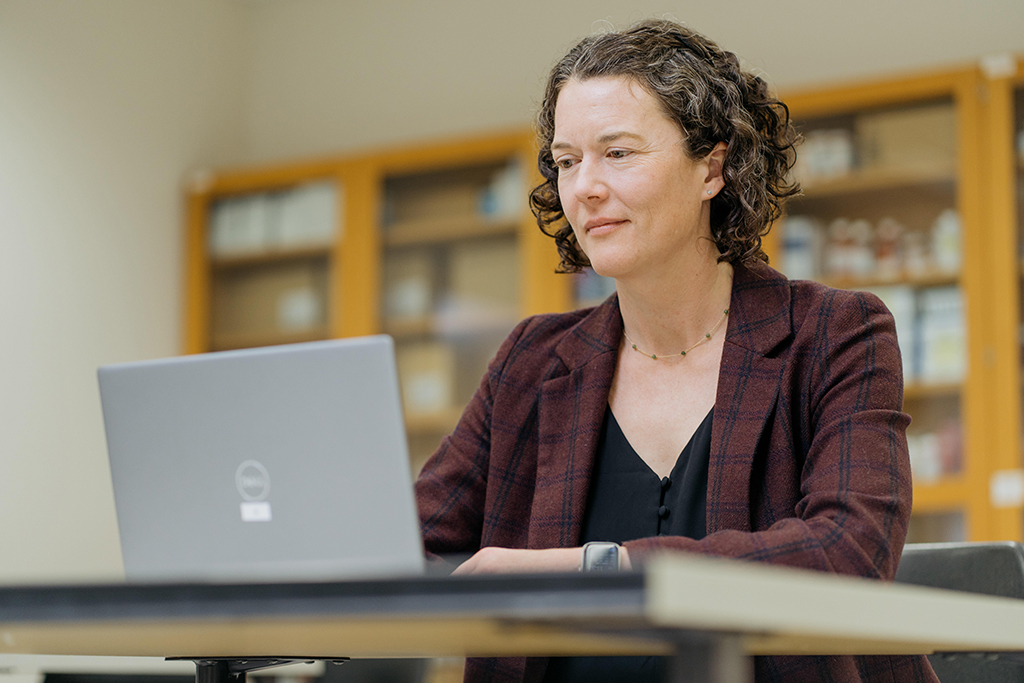
One of Barnett’s favorite classes, Interprofessional Collaborative Practice in HIV, further highlights her collaborations across campus. The course is taught collaboratively by Barnett and one faculty member each from the School of Medicine, School of Social Work, and School of Nursing and is cross-listed in all four schools. The course is representative of her teaching excellence, for which Barnett was recognized with her induction into the UW–Madison Teaching Academy as a Teaching Fellow in 2015.
Barnett’s demonstration of passion and leadership in IPE is evident through her work with CIPE on the UW-Madison campus where she serves on multiple committees and task forces such as the IPE Systematic Assessment Taskforce to reevaluate and align IPE assessments campuswide.
“Aligning the School of Pharmacy’s IPE assessments with those administered on campus would allow us to benchmark our results with those of other health profession schools,” she says. It also would help reduce “assessment fatigue” among students, something Barnett is ever alert for. The School’s IPE Committee recently condensed two assessments given two years apart into one that more accurately captures how students’ confidence in their IPE abilities evolves over time.
Brainstorming beyond Madison
Barnett seizes every opportunity to discuss and advance interprofessional education and practice beyond campus as well. She relishes her role within the IPE subgroup of the BTAA. She and BTAA colleagues have jointly presented on IPE initiatives and evaluations at the Collaborating Across Borders and NEXUS conferences.
“I find it really rewarding to work with colleagues who are not only from schools outside of pharmacy but also from other universities,” she says. “There’s so much to learn from one another.”
While in Washington, D.C. in March for the NAP induction ceremony, she and other fellows went to Capitol Hill to educate senators about interprofessional care and to advocate for the reimbursement of interprofessional telehealth services.
“It’s an important example of how interprofessional care impacts health outcomes and accessibility of health care for patients,” she says.
“Over the years, our School has built a program that is longitudinal, integrated, and progressive throughout the four years of our program. It has become the gold standard for other health profession schools.”
—Susanne Barnett
She’s also empowering student pharmacists to become advocates for interprofessional practice and education. Through a Professional Development and Engagement course, she’s helping them build essential skills, and she encourages PharmD students to attend the Pharmacy Society of Wisconsin’s annual Legislative Day, where pharmacists from across the state meet with elected officials to discuss key issues facing the profession.
“There has been such huge growth in interprofessional education and collaboration,” Barnett says. “But there’s still a lot of room for incoming pharmacy students to build those professional relationships and realize what they can do together. I want to see our graduates become agents of change to improve health outcomes for patients and to make their own jobs — and those of their colleagues — more rewarding.”
